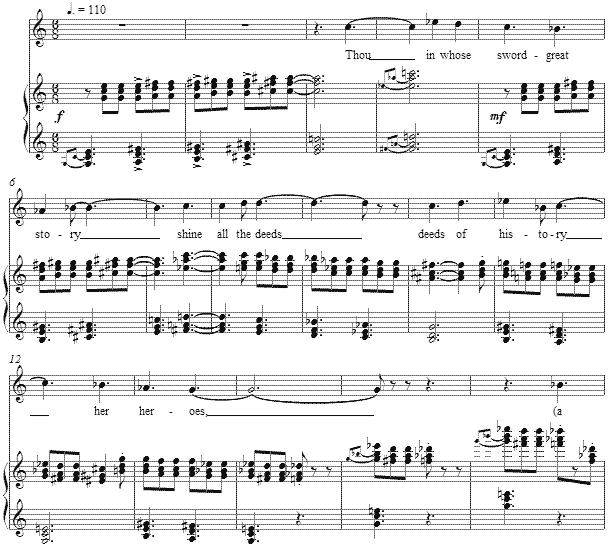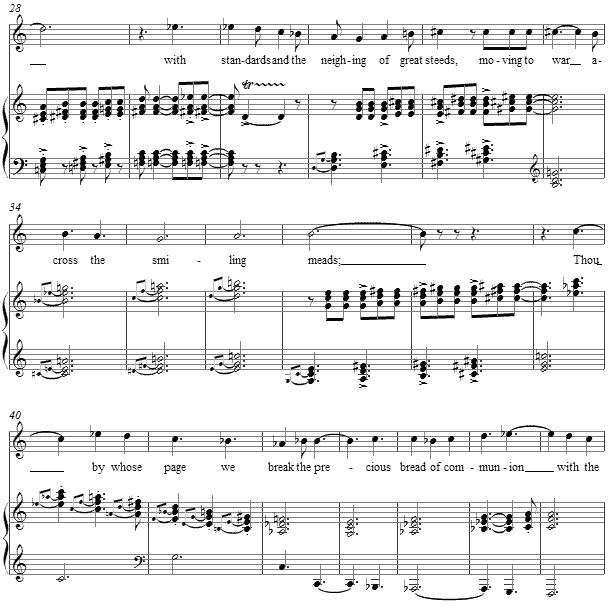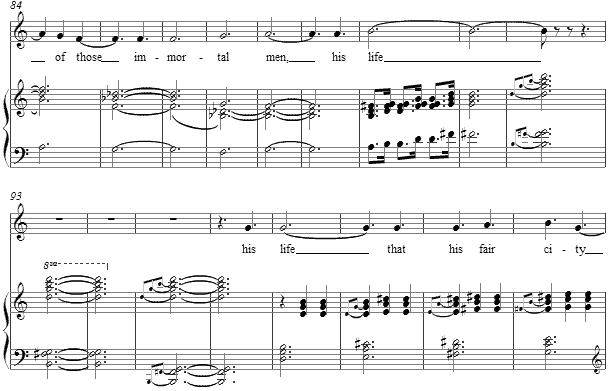Music and Texts of GARY BACHLUND
Vocal Music | Piano | Organ | Chamber Music | Orchestral | Articles and Commentary | Poems and Stories | Miscellany | FAQs
A sword-great story - (2009)
E. E. Cummings
for medium voice and piano
Thou in whose sword-great story shine the deeds
Of history her heroes, sounds the tread
Of those vast armies of the marching dead,
With standards and the neighing of great steeds
Moving to war across the smiling meads;
Thou by whose page we break the precious bread
Of dear communion with the past, and wed
To valor, battle with heroic breeds;
Thou, Froissart, for that thou didst love the pen
While others wrote in steel, accept all praise
Of after ages, and of hungering days
For whom the old glories move, the old trumpets cry;
Who gav'st as one of those immortal men
His life that his fair city might not die.[ 5 pages, circa 2' 25" ]
E. E. Cummings
The text was first published in Eight Harvard Poets in 1917, and subsequently republished under "V" in the small collection, Sonnets, as found in XLI Poems, 1925. The writer whom Cummings praises in this sonnet is Jean Froissart, a French poet and historian, born circa 1333-37 in Brabant and died circa 1400, Chimay, Hainaut, now modern Belgium. His writing created for him a wandering life, leading him through the whole of Europe. The largest of his works is the Chroniques de France, d'Angleterre, d'Ecosse, de Bretagne, de Gascogne, de Flandre et lieux circonvoisins, an account of European wars from 1328 till 1400. His accounts, though openly partisan, were popular and inspired a number of illuminated manuscripts depicting events as he told them. Modern versions of the Chronicles were published between the 1830s and into the early 1900s, and likely it is through on of these edition that Cummings comes to appreciate the Feudal tales of adventures, and the chivalric and courtly ideals of the fourteenth century.
The setting breaks these two verses into more sections, with the opening brightly triads in inversion climbing through whole steps in a light polytonal harmony. The ascending and descending arcs of the accompaniment are intended to image the sweeping "ups and downs" of such tales as Cummings was reading.
As the two strophes in Cummings' form are betrayed by three repetitions on the phrase beginning "Thou," I begin the vocal shape again as in the opening, yet with a different accompaniment, for the first gesture now precedes the repetition of the vocal motive. An incessant 6/8 pounds away through much of the setting, insisting on a forward thrust to its performance.
The notion that this heroism of an author and his pen is quite like unto the heroes of the battlefield is clearly Cummings' intention. Therefore the opening gesture is now broadened, not quite an alla breve, but enough to underscore the seriousness that Cummings finds in Froissart's life being dedicated that "his fair city might not die." For this a more serious telling of the opening gestures was suggested by the poem itself. A final reprise of the opening lines of the poem drives home the "sword-great story" and its author as hero alongside the heroes of such tales.
The score for A sword-great story is available as a free PDF download, though any major commercial performance or recording of the work is prohibited without prior arrangement with the composer. Click on the graphic below for this piano-vocal score.



